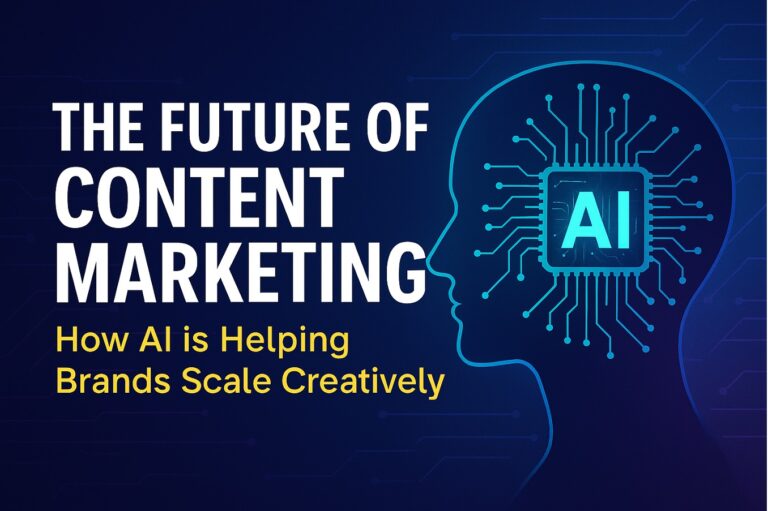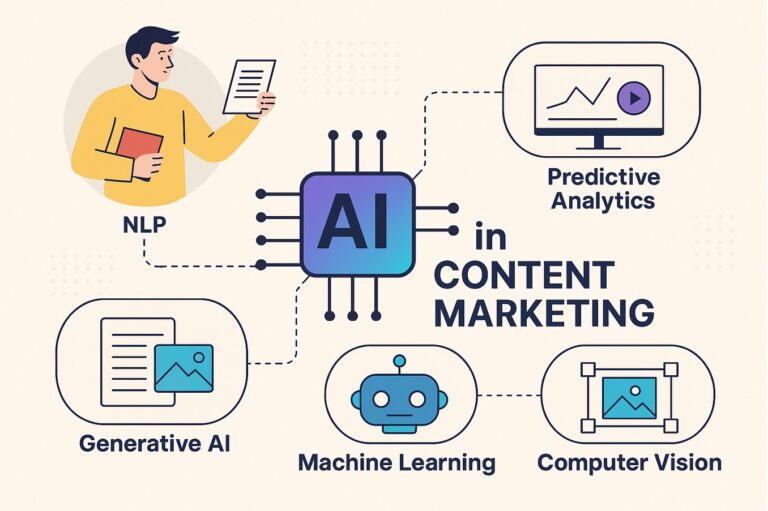
Unlocking Creativity: How AI in Content Marketing Is Revolutionizing Brand Storytelling

In the quick-paced era of Digital marketing, blog SEO techniques are forever evolving. The keyword-stuffing days of dominating Google are behind us (and hooray for that). Modern SEO is more intelligent, quicker, and a whole lot more user-centric. If you’re still holding on to outdated tactics, there’s a good chance your blog’s hiding somewhere on page 5. or worse.
What works then? How do you really get your blog noticed, clicked, and passed around in this algorithm-dominated era?
So if you’re a marketer, blogger, or simply someone who wants their content to be found, This guide is here to demystify what actually moves the needle — from intent-driven content and E-E-A-T guidelines to voice search optimization and semantic SEO. Whether you’re a content expert or just entering the game, this one’s for you.
With algorithms changing daily, platforms refreshing every other night, and the way consumers are behaving faster than ever before, the only means of remaining relevant is to keep learning. But not just anything—what you require are courses that teach you actual things: skills that brands are recruiting for, that clients are paying for, and that assist you in developing your own audience as well.
Introduction: The Evolution of Content Marketing
Content marketing has evolved greatly since the early 2000s. Gone were the days when it was all about promotion of blog posts and static banners with generic communication. But not now. Today, it’s a completely different ball game. Brands don’t compete with each other anymore—now they are competing against time, attention span, and constantly increasing the benchmark for personalization.
Audiences today demand more. They crave intelligent content that addresses them directly, appears on the appropriate platform, at the appropriate moment, and seems like it was created specifically for them. That’s where artificial intelligence comes in—not to eliminate marketers, but to empower them.
AI in content marketing is no longer a buzzword. It’s a necessity.
What is AI in Content Marketing?
Let’s get down to it. AI in content marketing is using technologies such as machine learning, NLP (natural language processing), and generative models (such as ChatGPT) to assist in creating, optimizing, distributing, and measuring content.
It’s not automation for its own sake—it’s smarter, data-driven decisions at scale.
Some of the most important AI techs driving this change:
- NLP: Enables machines to comprehend and generate human language.
- Machine Learning: Discovers patterns in content performance and audience behavior.
- Generative AI: Creates text, images, and even videos from scratch.
- Predictive Analytics: Forecasts what content will work and when.
- Computer Vision: Enhances visual content with intelligent analysis.
Audiences today demand more. They crave intelligent content that addresses them directly, appears on the appropriate platform, at the appropriate moment, and seems like it was created specifically for them. That’s where artificial intelligence comes in—not to eliminate marketers, but to empower them.
AI in content marketing is no longer a buzzword. It’s a necessity.
Why Brands Need AI to Scale Content
Let’s face it—content demands in 2025 are wild.
You’re expected to roll out:
- Tailored emails for each user segment,
- Weekly blogs with SEO baked in,
- Fresh reels and TikToks every other day,
- Memes, infographics, newsletters—you name it.
Doing this by hand? That’s a recipe for burnout.
AI assists brands in:
- Creating ideas more quickly,
- Personalizing content without sacrificing their voice,
- Saving on production costs,
- And keeping everything consistent on all platforms.
In short, AI assists you in keeping up—without compromise.
Top AI Tools Revolutionizing Content Marketing in 2025

There’s an AI tool for everything these days. Here are some powerhouses revolutionizing the content game:
Text & Copywriting:
- Jasper AI – For viral marketing copy and email content.
- ChatGPT – Versatile and perfect for brainstorming to writing long blog posts.
- Copy.ai / Writesonic – For swift taglines, product descriptions, or ad scripts.
Visuals & Video:
- Canva AI – AI-designed templates make it easy to create.
- Lumen5 / Runway ML – Convert text to compelling video content.
- Synthesia – Generate realistic AI avatars to display your content.
SEO Optimization:
- Surfer SEO / MarketMuse / Frase – Optimize SERPs, optimize your blogs, and aim for better keywords.
Social Media Management:
- Buffer AI / Hootsuite / Lately AI – Plan, Schedule and post, write descriptions, and monitor performance—all with AI support.
How AI Makes Content Creation and Ideation Better
Looking at a blank page is no delight. Fortunately, AI can assist you in outsmarting creativity blocks.
Here’s how it works:
- Provides blog topic ideas based on trends,
- Creates outlines customized for your keywords,
- Assists in developing catchy titles and CTAs,
- Writes complete drafts that you can refine rather than from scratch.
Essentially, it provides your creativity with a head start. You’re still the boss—it just makes you go faster with facts on your side.
Audiences today demand more. They crave intelligent content that addresses them directly, appears on the appropriate platform, at the appropriate moment, and seems like it was created specifically for them. That’s where artificial intelligence comes in—not to eliminate marketers, but to empower them.
AI in content marketing is no longer a buzzword. It’s a necessity.
AI for Personalized Content at Scale
Personalization is no longer amazing—it’s what’s expected.
Audiences don’t want generic messages. They want content that’s made especially for them.
AI enables this by examining:
- What users clicked on,
- What they purchased,
- Where they are,
- When they’re most active.
Real-world magic:
- Netflix thumbnails are customized based on what you’re most likely to click.
- Amazon personalizes its homepage for every shopper.
- Spotify playlists somehow sense your mood.
Brands that leverage AI for personalization don’t only engage more—they create loyalty.
AI in Visual & Video Content Creation
Those days of requiring a pricey camera crew for video content are behind us now.
With AI tools, you can:
- Turn blog posts into quick explainers or animated videos,
- Create graphics and carousels in seconds,
- Even virtual brand ambassadors using AI avatars.
Game-changers to check out:
- DALL·E – Creates creative images from text prompts.
- Synthesia – Creates AI spokesperson videos in various languages.
- Runway ML – Edits and improves your video content without a studio.
These are Ideal for quick-paced campaigns or teams on limited budgets.
Audiences today demand more. They crave intelligent content that addresses them directly, appears on the appropriate platform, at the appropriate moment, and seems like it was created specifically for them. That’s where artificial intelligence comes in—not to eliminate marketers, but to empower them.
AI in content marketing is no longer a buzzword. It’s a necessity.

AI in Social Media Marketing and Scheduling
Social media moves fast—and keeping up is hard.
AI tools now:
- Recommend best posting times,
- Write captions with optimized hashtags,
- Turn long-form content (like blogs) into snackable posts,
- Track what’s performing well and suggest tweaks.
Tools you’ll love:
- Buffer AI – For content planning and performance insights.
- Lately AI – Turns your podcasts or blogs into dozens of engaging posts.
- Hootsuite AI – Helps with social listening and automated responses.
So, instead of rushing each day—you plan better and post better.
Audiences today demand more. They crave intelligent content that addresses them directly, appears on the appropriate platform, at the appropriate moment, and seems like it was created specifically for them. That’s where artificial intelligence comes in—not to eliminate marketers, but to empower them.
AI in content marketing is no longer a buzzword. It’s a necessity.
AI for SEO & Content Optimization
Algorithm keeps changing for search engine, and AI is your best friend here.
- Suggest trending keywords,
- Aid in ranking for featured snippets,
- Optimize your headlines and readability,
- Demonstrate how your content compares with the competition.
Recommended by pros:
- Frase – Live topic research and content briefs.
- Surfer SEO – Assigns your blog a content score and recommends improvement suggestions.
- Clearscope – Compares you with top-ranking pages.
It’s equivalent to having an on-call SEO consultant, 24/7.
Audiences today demand more. They crave intelligent content that addresses them directly, appears on the appropriate platform, at the appropriate moment, and seems like it was created specifically for them. That’s where artificial intelligence comes in—not to eliminate marketers, but to empower them.
AI in content marketing is no longer a buzzword. It’s a necessity.
AI-Powered Data Analytics for Smarter Campaigns
Content is just conjecture without data.
AI tools assist marketers in:
- Predicting what type of content will work,
- Telling them which pieces require updating or repurposing,
- Tracking engagement across platforms,
- Recommending next steps based on real user behavior.
This type of understanding equates to improved ROI, quicker pivots, and campaigns that truly engage.
Audiences today demand more. They crave intelligent content that addresses them directly, appears on the appropriate platform, at the appropriate moment, and seems like it was created specifically for them. That’s where artificial intelligence comes in—not to eliminate marketers, but to empower them.
AI in content marketing is no longer a buzzword. It’s a necessity.
Disadvantages of Applying AI in Content Marketing
Let’s not be naive.
There are some bumps:
- Tinny or mechanical voice if not proofread by a human.
- Bias in training data—what the AI is taught impacts what it produces.
- Over-reliance can result in bland, lifeless content.
- Data privacy issues if user information isn’t used responsibly.
Pro Tip: Have AI as your sidekick, not your commander. Always introduce human review to guarantee originality and authenticity.
How to Implement AI into Your Existing Content Strategy
Here’s a guide to begin with:
- Step 1: Review your content process. What’s slow or repetitive?
- Step 2: Select AI tools that address your most significant bottlenecks.
- Step 3: Train your staff. Most tools are simple with a little practice.
- Step 4: Begin with ideation or initial drafts—then polish.
- Step 5: Track performance and iterate.
You don’t require a complete overhaul. A couple of clever integrations can save hours weekly.
Audiences today demand more. They crave intelligent content that addresses them directly, appears on the appropriate platform, at the appropriate moment, and seems like it was created specifically for them. That’s where artificial intelligence comes in—not to eliminate marketers, but to empower them.
AI in content marketing is no longer a buzzword. It’s a necessity.
Real-Life Case Studies or Brand Examples
A few brands have already gotten the AI-content balance right:
- HubSpot: Leverages AI to propose blog topics and generate email variations.
- Buzzfeed: Creates viral quizzes based on AI generated ideas.
- Coca-Cola: Collaborated with OpenAI to produce a complete ad campaign with AI-written scripts, images, and voiceovers.
These aren’t experiments—they’re evidence that AI has the potential to enhance creativity, not replace it.
Future Trends in AI Content Marketing (2025 and Beyond)
The AI train is not slowing down. Here’s what’s coming:
- AI-created brand avatars bringing content to TikTok or Instagram.
- Voice based content generation—speak to your AI assistant and receive a blog in return.
- AI + AR = Personalized real-time experiences, such as virtual shopping assistants.
- Hyper-real-time content that changes on the fly depending on user engagement.
Picture content that changes while the user is reading or viewing it. Crazy, isn’t it?
Conclusion: Accepting AI Without Ditching the Human Touch
AI is an amazing tool—but behind it all remains the human touch.
The winners in 2025 aren’t the ones who churn out the most content, but those who churn out smart content—leveraging AI to save time, discover insights, and grow quickly—without sacrificing their voice.
Last takeaway? Let AI do the heavy lifting. But preserve the soul of your brand with creativity, emotion, and empathy. That’s the sweet spot.
Audiences today demand more. They crave intelligent content that addresses them directly, appears on the appropriate platform, at the appropriate moment, and seems like it was created specifically for them. That’s where artificial intelligence comes in—not to eliminate marketers, but to empower them.
AI in content marketing is no longer a buzzword. It’s a necessity.